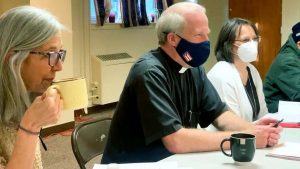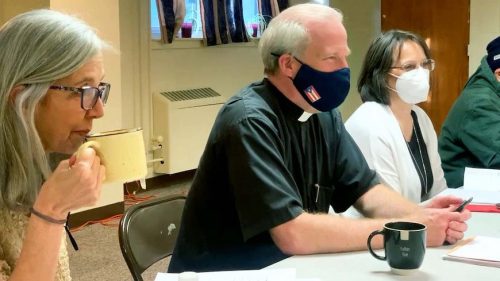By Gina Christian | Catholic News Service
PHILADELPHIA (CNS) — The Philadelphia Archdiocese plans to offer to as many of the faithful as possible “multiple opportunities to participate and be heard” in listening sessions in preparations for the 2023 world Synod of Bishops on synodality, said Msgr. Brian Hennessy.
The priest, who is pastor of St. Alphonsus Parish in Maple Glen, Pennsylvania, is the coordinator for the archdiocesan phase of the synod.
He issued a letter about plans for in-person and virtual gatherings in parishes and among various groups across the archdiocese.
The listening sessions will be led by trained facilitators from the local communities. Results of the sessions will be compiled into a report in June.
The two-year synod process was launched by Pope Francis in October 2021, with the theme of “communion, participation and mission.”

Archdiocesan sessions, which will include breakout meetings, will be facilitated by the Catholic Leadership Institute, based in Malvern, Pennsylvania. They are set to take place in person on the weekends of March 19-20 and April 2-3, with online gatherings to be held between March 19 and April 9.
Parishes, as well as institutions and communities supported by the Philadelphia Archdiocese, are encouraged to host local synodal meetings from March through May. The Catholic Leadership Institute will offer facilitator training for the sessions.
In an electronic module still under development, individuals will be able to contribute to these consultations from the comfort of their home.
The archdiocese has set up a synod webpage — ArchPhila.org/synod — for access to synod materials for the archdiocese that are currently available, with more to be added.
In tandem with the synodal sessions, the Catholic Leadership Institute also will implement its “Called for More” initiative that will survey pastoral engagement among archdiocesan clergy, parish leaders and parishioners.
“The idea behind a synodal church is that we recognize yes, we are under the guidance of the Holy Spirit, under the magisterium and the legitimate authority of the bishops, but we’re a church that listens to each other,” said Msgr. Gregory Fairbanks, an ecumenical specialist and dean of the School of Diaconal Formation at St. Charles Borromeo Seminary in Wynnewood, Pennsylvania.
“Everybody has a voice in order to be able to share their experiences, their points of view,” he told CatholicPhilly.com, the archdiocesan online news site.
Without signaling that the church is “a democracy,” the synod represents “an attempt to make sure there are more voices being added to the decision-making process, so that we can … be better informed by hearing from God’s people at all levels,” he said.
Throughout the church’s history, the term “synod” has been applied to a variety of assemblies convened from the diocesan to the universal levels, with the apostolic Council of Jerusalem (found in Acts 15 and Gal 2:1-10) regarded as a paradigm for synods.
In 1965, St. Paul VI instituted the Synod of Bishops as a permanent council “to offer more effective assistance to the supreme Shepherd” of the church.
Almost 20 years ago, the Philadelphia Archdiocese completed its own synod, a nine-year process that entailed “hundreds of Catholics well organized in committees with meetings, moderated discussions, statistical information and theological guidance, dedicated staff and finally, a report with recommended action steps going forward,” wrote CatholicPhilly.com editor Matthew Gambino in a November 2021 column.
Yet strategic action plans are not in themselves the goal of a synod, he noted.
“The journey is the point, not the destination,” he said. “A synod should lead a church community to learn how to listen — to one another, and to the voice of the Holy Spirit moving in our lives. And listening should become a permanent feature of the church.”
Msgr. Fairbanks agreed, adding that such encounters should prompt not fear, but faith.
“Listen to people … (and) don’t be afraid to listen to another point of view,” he said. “Keep your eyes on the end goal: What does it mean to be Catholic, (and) what is the mission of the church? The salvation of souls, making sure people know about Christ, hear the message of Christ and come to God in the sacraments.”






















